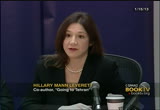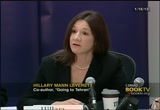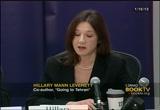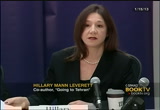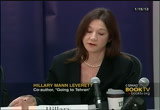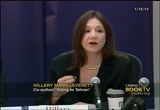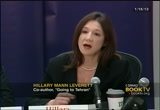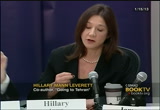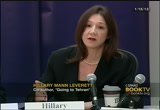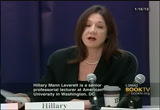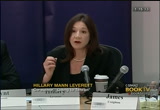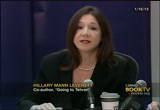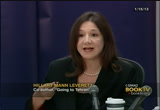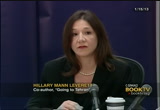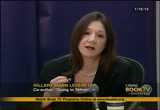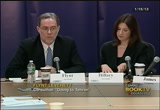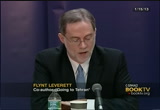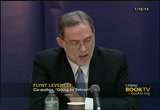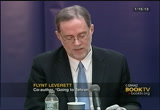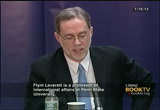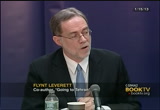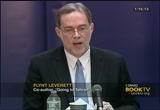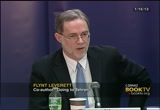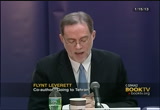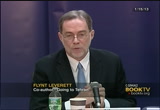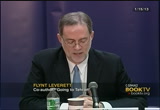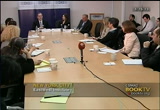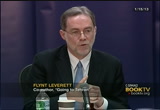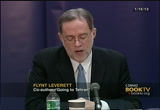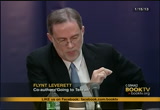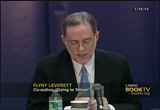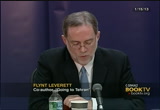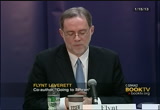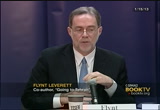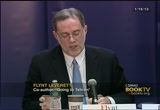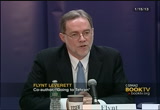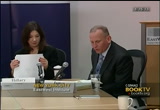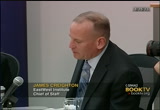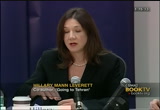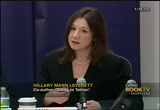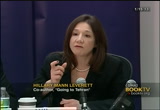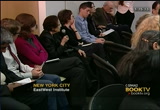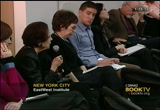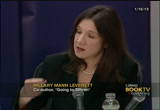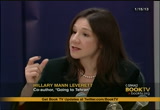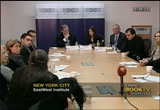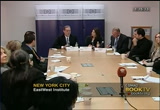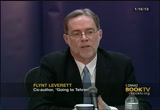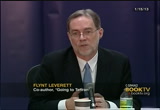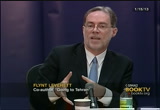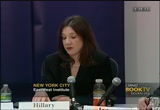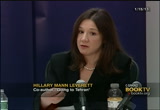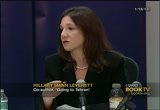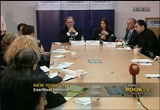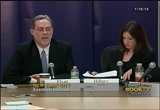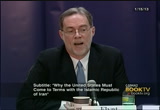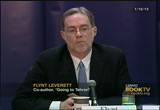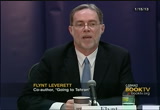tv Book TV CSPAN January 27, 2013 7:00pm-8:00pm EST
7:00 pm
7:01 pm
government with iranian officials here she's nice to hear professor lecture at american university in washington. the writing has appeared in "the new york times," "politico," foreign policy and washington monthly among others. they came to us last night from virginia, took a late night train and what i'd like to do is turn it over to you for your thoughts and comments to start off. >> thank you very much. i'm going to start for us today. let me thank you much for hosting us to thank you for coming. it's an honor pleasure and we look forward to nature scene discussion today. i'm going to start with two provocative themes from our new book, "going to tehran: why the united states must come to terms with the islamic republic of iran". the first of these means, and these two get at the heart of our book. the united states is today
7:02 pm
enhanced and for the past two years a power and relative decline in the middle east. the second core team as the biggest beneficiary of american ongoing decline in the middle east is the islamic republic of iran. if you're not sure you agree with these propositions, i want to ask you to compare the relative position of the united states and the islamic republic of a rant in middle east today with where they were on the eve of 9/11 over 10 years ago. on the eve of 9/11, every single government in the middle east with either pro-american government egypt and turkey in negotiation effectively to become pro-american but government. in libya are anti-iranian like saddam hussein's government in iraq.
7:03 pm
every single government in the middle east is either pro-americans in negotiations to become pro-american or anti-iranian. it pretty good position for the 90s dates in the middle east. but because of election, today governments across the middle east and egypt, tunisia, lebanon, palestine, turkey, iraq are on no longer pro-american or anti-iranian. they are all pursuing at least independent foreign policies, which are by definition much less to see a stick about strategic cooperation with the united states and much more open to the islamic republic of iran. simply put, today relatively speaking the united states is in a profoundly weaker position in the middle east and the sonic republic of iran is in a
7:04 pm
significantly stronger position. this essentially have been because there is a dramatic shift in the middle east onto power. in our book, "going to tehran," we describe how part of this shift has been as occurring is because of mistakes and american policies in the middle east. but we also describe in our book that part of what is going on a something vastly underappreciated in the last, which are the successes of the islamic republic of iran, which are also driving a shift in the regional balance of power. we arguing about these two are inextricably linked. the successes that the islamic republic is driving, that they are linked and it is in fact americans dysfunctional policy towards the islamic republic of iran, which is part of our decline in the middle east.
7:05 pm
we also argue will take strategic realignment of the united states that the islamic republic of iran to enable america's strategic recovery in the middle east. we unpack these arguments by examining the bases for u.s. dominance in the middle east, something increasingly driven since the end of the cold war by americans in a capability to project enormous amounts of conventional military force in the middle east. no one else can project this kind of military force in the middle east today or for years to come. this has given the united states extraordinary economic and political influence in the middle east and in fact reinforced are military and economic dominance and other key parts of the world.
7:06 pm
but our failures in afghanistan and iraq in particular have underscored especially for middle eastern publics the limit of what american military can accomplish. we arguing our book that these failures in policy would not just idiosyncratic ideologically generated products of the george bush administration. as we described in our book, the stem from a much deeper source that cuts across both democratic and republican administrations than something we describe as the united states getting into a post-cold war temptation to act as an imperial power in the middle east. it is this imperial turn in america's middle east policy pursuant to very little regard for reality on the ground in the middle east that's proven not
7:07 pm
just quixotic, but deeply damaging to american interests. as a candidate that can take us in it not president obama thing seemed to really understand appeared to type about it creatively during the campaign. he pledged about two notches withdraw american troops from iraq, the change would be called the american mindset that gotten us into the strategic to go invading iraq in place. he pledged to really change america's middle east policy. instead, the obama administration has pursued the same so supposes that is predecessors, the same that inflicts damage to america's strategic position. it covers out, the obama administration today is not just presiding over his called middle east peace process. the very demise of the nice features solution to the israeli-palestinian conflict.
7:08 pm
of the obama administration intervention in libya was able to overthrow moammar gadhafi, if not incubating in libya at a significant threat to american security interests. as we detail in our book, "going to tehran," the obama administration has gone beyond and threatening the islamic republic to do something which argued even more dangerous, to discard anime engagement of the strategy for dealing with the islamic republic of iran. they're sure to reach out to the islamic republic of iran of field and therefore engagement is perhaps. the result is on president obama/the middle east balance of power has shifted further away from the united states and allies and i was at the end of
7:09 pm
the george w. bush administration. this brings me to another critically important part of our book, which is how the islamic republic of iran has become the biggest that issue of american mistakes and are ongoing decline in the middle east. in our book, we lay out how by pursuing a foreign policy and building a domestic political order that attracts publics, the islamic republic of iran has been able to take an impeach of american mistakes, to improve its own position dramatically. the key to the islamic republic successes has been that beyond the shift in the distribution of power, who has power in the middle east is a detailed earlier, something even more important is happening and that is the middle east will power itself is changing.
7:10 pm
it is now increasingly less defined by hard military capabilities for the united states has a clear advantage in the islamic republic of iran is relatively positioned and more defined in terms of the balance of influence are the islamic republic of iran has real unique advantages. as we explained in our book, the islamic republic is encouraging and taken advantage of this important transformation in the middle east. one of the most remarkable thing about this shift the balance of power over the last decade, away from the united states and allies in towards the islamic republic of iran and its allies is the shift has had virtually nothing to do with their increase of military force for economic coercion. the foam of the public hasn't invaded anybody or sanctioned
7:11 pm
anybody. it's all about the islamic republic soft power. in our book, we set the islamic republic cultivation and reliance on soft power in a strategic context via a critical set of services we drew on for a book with the unique and unparalleled opportunities we have had to sit and listen to my name to amounts and officials explain how the world looks strategic finance the bid, their point of view. this is almost never done an american analysis of iran today. from our experience, research, interviews, we detail how from looking at the world from tehran, one these 15 neighboring states, nearly all of whom have
7:12 pm
in hostile to the very idea of an islamic republic. not just hostile, but iran's neighbor to the east, afghanistan killed iranian diplomat in our consulate and mother should read. the neighbor to the west under saddam hussein without an islamic republic other arab neighbors invaded eland, killing 300,000 of his citizens. today, many of the same era countries that helped iraq invade and fight the islamic republic today hosts thousands of u.s. troops and billions of dollars worth of the most deadly u.s. weapons. all poised and threatening to attack islamic republic to disarmament of mass destruction it does not have. to do a significant attorney
7:13 pm
charges, the islamic republic of iran has built a strong, defensive military capability. but it has virtually no capability to project military power offensively be honest orders. so what it is done in its real success and national securities energy has been to develop a software strategy. a strategy that galvanizes regional publics, galvanizes these publics most intensely of grievances, including grievances against the united states and israel and most importantly against their own unrepresentative pro-western government in regime. amendment the islamic republic has done is aligned itself with public opinion at south in the middle east to constrain hostile governments from attacking a.
7:14 pm
just think about how barbering largely shia population would react to the fleetest our fifth fleet based in bahrain to attack the islamic republic today. u.s. military planners could hope that the iran's population would be passive as they think they assumed maybe even five years ago. but today it clearly seems reckless. for other ridiculing many american policy elites do with the islamic republic, the appeal to regional public actually works. it works to constrain the united states and hostile, unrepresentative pro-western neighboring iran. iran is also the two reinforce these aspects of a software strategy of a number of years at picking what we would call
7:15 pm
winners, zero, hamas, hezbollah, shia groups, even the muslim brotherhood political ally and key regional arenas across the middle east. this year's line that are the islamic republic of iran on these groups have paid off because now their regional allies have become the most influential players in their respective arenas today. the result is today's the islamic republic of iran and its ideas of the pacific tory government and independent foreign policy that has real influence, real power in countries across the middle east from egypt to bahrain that were once clearly in america's camp. in strategic terms, the islamic republic of iran has been
7:16 pm
dependencies into its narrative not its drones, not its tanks, using political awakening of middle eastern public to offer the very nature of power politics in the middle east. at least describe in our book, to "going to tehran," it has been effective foreign policy and national security strategy for the islamic republic of iran, one repeatedly underappreciated in the united states. at this point, i'm going to hand it over to flynt to continue our discussion. tonight to pick up on hillary's point on the strategy for resetting the regional balance of power that iranian policymakers have long seen against the islamic republic, it is important to note and for americans to understand that it's only an islamic republic of iran, which can accrue these
7:17 pm
kind of soft power games. a pro-western secular republic of iran couldn't do it. only the islamic republic of iran can do it. as we discussed in our book, instead of recognizing and pondering this american political policy media elite are said to be picked in the republic is an illegitimate system so despised by its own population that isn't imminent danger of overthrow. american elites have been doing this literally for more than 30 years, virtually since the islamic republics founding the iranian revolution. for more than 30 years the islamic republic has simply defied the relentless predictions of its collapse or defeat. the islamic republic has
7:18 pm
survived because the integration of participatory politics and election principles and institutions of islamic governance and a strong commitment to foreign policy independent, this model is an actual fact what a maturity of romanian living inside their country one. they don't want a political mortar and western-style secular liberalism. they want an indigenously generated political order that reflects their cultural and religious value is the reformist president hamid said to me shortly before leaving office, these are his words. freedom, independence and progress within the context of both religiosity and nationally to achieve. that's what the islamic republic
7:19 pm
but valid for the chance to pursue. this is the vision of imam khomeini in the islamic republic on the tuition and even those iranians who want the islamic republic to evolve in significant ways. at the end of the day, most of those iranians still wanted to be the islamic republic of iran. in the course of our visit to tehran, a member of the politicians policymakers, scholars that we talked to have pointed out that the islamic republic does not collect cells and islamic faith like saudi arabia does. for that implies a perfection that iranian safely invested in the system's note they have not changed. in iran, the islamic republic is a definition something that is very much a work in progress.
7:20 pm
the islamic republic has made progress in a number of ways. contrary to deeply rooted at times find western stereotypes, the islamic republic has achieved far more progress outcomes in alleviating poverty, health care, providing educational access and expanding opportunities for women in the shah's regime aggregate. hillary and i are happy to go into this morning q&a if you like, let me give you a couple examples of what i'm talking about. the islamic republic has developed a hope your system that is greatly increase and reduce infant and child mentality in iran. the provision of health care to rural areas has been particularly impressive since the revolution.
7:21 pm
the islamic republic is basically equalized outcomes in urban and rural setting in a knot or which is really quite extraordinary in an international context. get this. there are no iranian doctors and public health specialists working with state university and ngos state of mississippi to introduce iranian styled rural health care delivery into medically underserved parts of the mississippi delta. the islamic republic is also greatly expanded educational opportunities with letter series and basically eliminating gender disparity in educational access. one facet of progress that remained almost completely unappreciated in the last is the way for access to higher education is altering the status of iranian women.
7:22 pm
while the islamic republic places restrictions on women, that westerners would consider unacceptable in their own societies. the majority of university students are now female. the majority of students in the best universities are now female. the majority of medical students in iran are now female and women's presence is increasingly felt across an array of academic and professional discipline. now notwithstanding these comic republic staying power, foreign policy pundits here who in many cases have no direct connection to on the ground reality in siberian and a cadre of so-called iran thanks very common many of whom are ex-features serving in american
7:23 pm
history in mice fled the revolution and don't want to see the islamic republic succeed. these commentators continue to misread and misinterpret a reigning politics telling a system is on the verge of. whenever it seems in "going to tehran" is that until american south was named to the agenda driven analysis from such people come in the 90s gates will continue to get it iran policy ron and will continue losing ground in the middle east. a good example of what i'm talking about in this regard came in 2009 when in a collective act of analysis they were shopping in, american elites focused on former prime minister campaign incumbent president, mock mohammed jinnah shot in the era of the presidential election and the green movement that emerged as
7:24 pm
the keystone in american strategic of the middle east. american and other western elites by mantis paid by the very one in june 2009, ahmadinejad one the same elites universally in the outcome is a fraud. they did so, even though every methodologically sound before or after the election, including posed by western polling groups, fortuna non-showed ahmadinejad's reelection is roughly two thirds of the vote, which is what the official results show was eminently possible and americans embraced a narrative of election fraud, even though neither must it be for anyone else ever presented any evidence of how the election was stolen. this never demonstrated that fervently conditioned american and western elites novation of
7:25 pm
the cream of land from the way the per trade as the popular out raising them for the cipro at the republic perhaps in just a few months. but it was evident to anyone prepared to look soberly that reality that even on a tiny, the green movement does not represent anything close to a majority of iranian and within a week of june 2000 election, the business social basis or entrapping. the myth of the islamic republic the legitimacy and instability did not die as a result of the green movement's failure. india got a new lease on life in early "deadline artists: scandals, tragedies and triumphs" when the ferry of for weakening began. through the land that continues to shape most western commentary on politics, it seemed inevitable that the popular discontent like as it took a
7:26 pm
pro-american leaders in tunisia and egypt first leadership change in yemen is allied governments and seriously to another u.s. helicopter made in bahrain would engulf the reigning government, too. most independents who jumped on the punishing change bandwagon hats back on for another right. on february 21st, 2011. on cnn gts offered a bet that the reigning regime will not be there in a year's time, close quote. two days later and foreign policy, hillary and i took stairstep a nice feature. i recognize the notion that two former u.s. government officials turn university professors betting george soros and anything made an absurd, but that's what we did.
7:27 pm
we given that not only with the islamic republic still beat the rams government and a year's time, but the balance of influence and power in the middle east to be tilted even further in the favor. almost two years since iris made his feature as they were eager to collect on it. later in 2011, the back-and-forth between ayatollah khomeini, the islamic republic later and president ahmadinejad over the resignation reinstatement of the intelligence minister and other issues. the same cast of iran expert on mainstream media gave developments overblown, even hysterical treatment portraying them as unprecedented signs of an insecure regime. such analyses revealed the very least lamentable ignorance about the islamic republic political history, which since the revolution has been marked by an touch of the same kind of
7:28 pm
intense comp titian over policy and power that you see today in the united states. tensions between imam khomeini, the islamic republic's founding father in the first elected president resulted in impeachment during wartime in 1881 after the reformists, mohammed became president in 1997. his disagreement with ayatollah khomeini, which defeated imam khomeini were at least as intentioned between khomeini and ahmadinejad. in iran, the leader are the neo-and are not an indicator that systemic. they are politics as usual in a system of multiple power institutionalized checks and balances. and the factory approach in many so-called iran experts in the
7:29 pm
united states, after reigning to slay the third of contestation over policy relative positions within their system that virtually everywhere else in the world recall normal politics, then iran experts tell us this would happen and pathological and the system must be coming apart. despite these experiences and other similar hearing is we go through in the book, american political and policy of the continue promoting the idea of the myth of the islamic republic's illegitimacy and fragility. today this myth comes into interlocking merges, when sanctioned now finally working to undermine the islamic republic's basic stability and that the arab awakening has left the islamic republic isolated in the neighborhood.
7:30 pm
on sanctions, hillary and i returned from her most recent visit to iran last month. we're happy to talk more about current economic conditions, social and political conditions in the q&a. for now, let me say simply that no one who has walked the streets of tehran who has seen iran's economy is not collapsing or attacked or range of iranian could possibly think that sanctions are working in a way that will compile the islamic republic conclusion ursa minor to american demands on the nuclear issue. that is delusional. on the arab awakening, the same tendency save actions are working and they seek to embrace the defined proposition at the same social current of pro-american leaders in tunisia and egypt are empowered islamists across the arab world
7:31 pm
will in iran somehow transformed these tonic republic into a secular liberal state. that is truly logic defined. in tehran, we can tell you iranian policymakers and analysts see the arab awakening is usually passes for the regional position. they judge correctly that any arab government which becomes warmer sentiment of the people's beliefs, concerned were also become less enthusiastic about strategic cooperation, let alone israel and foreign policy independence. tehran doesn't need. government to need more program in. plus pro-american, less pro-israel and more independent. more particularly, one fears in washington because of the arab
7:32 pm
awakening that tehran is going to lose its only area to outweigh with dire consequences, one of the islamic republic or even internal stability. i make two points on this. first comes. his insurance only. allie today. syria is even iran's most. allie today. they sue president george w. bush announces democrats who supported him after 9/11, the islamic republic's most important ally two days in the area in iraq. second point, the reigning policymakers don't believe the syrian president bishara lessard will be overthrown, at least not the syrians. aside still retain support of half the syrian society, it even compelled at some point to surrender damascus, he and his forces would continue to control a significant part of territory under these circumstances,
7:33 pm
serious are they likely to become ally of the west indeed any sort of possibly representative post is that government isn't going to be more pro-american or more pro-israel. such a government might be less keen about keeping serious border with israel quiet and that would be just fine for the islamic republic. iranian officials believe that overall developments in the middle east are continuing the regional balance in tehran savior. as far as the press picks for u.s. iranian diplomacy or can you come to hillary and i think one of the most dangerous myths promoted by some of america's so-called iran expert is that the islamic republic is so ideologically committed to anti-americanism or so dependent on anti-americanism for domestic legitimacy that it can't ever seriously contemplate improving relations with the united states.
7:34 pm
this is thoroughly contradicted in the historical records. as we shown are both, the islamic republic has been prepared for decades for better relations with the united states. are happy to talk about that in q&a. in the arabian view, this is only possible on the basis of the quality and mutual respect, meaning the united states needs to accept the islamic republic. the united states hasn't been willing to deal on this basis. even under president obama, his administration has participated in multilateral nuclear and appreciation and use iran's unwillingness to surrender u.s. demand to intensify sanctions of covert action, launch cyberwere against the islamic republic can come ever closer regime change
7:35 pm
is the ultimate goal of american policy is. why u.s. officials regularly excoriate tehran for being too internally to negotiate variously, it is washington that is not in diplomatically serious. iran has been prepared to accept more intrusive negotiated moment on its nuclear activity if western powers recognize its right to enrich uranium of international safeguards. president obama refuses to knowledge iran's right to enrich. this would require acknowledging the islamic republic as a legitimate political order representing legitimate national interests and is a rising regional power unwilling to support its power to washington as for example washington regularly expected of egypt under sadat and mubarak.
7:36 pm
the society hillary a nice day obama has done more damage even than george w. bush because he's discredited the idea by saying he tried but failed when in fact he has not serious are tried. [inaudible] >> yes, that's fine. no american president has been prepared to do this, to accept the islamic republic. and this is a key argument. this is the only diplomacy can succeed. there is an important precedent for this in modern american history. it's appropriate to call the cinema and month in which richard nixon come with birthday falls. nixon and kissinger's of maine to china. their great achievement was not that the type to beijing. the united states had been talking for years and ambassadorial level talks that
7:37 pm
had gone nowhere. nixon and kissinger's achievement was that they accept good and persuaded their countrymen of the people's republic of china people's republic of china as legitimate political order rep resenting the entries that the united states for its own interest and to come to terms with. that's what we need to do with the islamic republic today. is obama going to be a divisiveness second term? thank you very much. hot mark >> we've got about 20 minutes left. i just want to ask one question. as i read through your book, one of the quotes you have, karen has never attacked another stater than threaten to attack one. it got a little bit of
7:38 pm
experience when i was at westwood on the 21st of january 1981 when we had dinner when they came out. i think there will be some argument along that regard. i spent two years in afghanistan and several of the operations they did a cover cachet somewhat been over my with uranium marking and our assessment was they come from iran. if you look at the 2006 israeli fights in lebanon, he would have discussions say about iranian involvement in that operation. so i hear you that they have not invaded another country, but clearly supporting in other ways
7:39 pm
to something in my short experience i've seen. i wonder how you respond to those activities. see map of affairs. i think there are very important point and particularly this is something that drives the perception of the islamic republic that is an aggressive state, particularly with the rhetoric or how rhetoric is yesterday at the islamic islamic republic is aggressive and particularly aggressive vis-à-vis the state of israel. you can't only had the islamic republic will wipe it off for not. clearly the islamic republic of iran had the bad relationship with israel. it doesn't accept it. it doesn't accept his political order in terms of how distant rain chases a large set of the population. the islamic republic also has used in terms of its neighbors and how their orders hostile to iran see a lot of these is
7:40 pm
hostile to it. but we're trying to get across what aggrandize to respond to what it sees as the threat is not to threaten to attack, not to threaten to invade and is not to attack or invade. the islamic republic has never attacked or invaded any other country. that's not what it does. it does something even more powerful, something even more potent vis-à-vis the united states that we can't really compete with as we stay conventional military power, which is first and foremost develops relationships with groups on the ground. those relationships have much to do it and mostly to do with soft power you, appeal in terms of participatory government, foreign policy and its resistance to occupation. other than occupation is ended as the war the u.s. occupation in tennis in chile raceways in
7:41 pm
iraq. it is that very, very effectively. but around like other states under the shah, other states also butchers as those relationships with support, whether that's financial support for guns and things like that. what we're trying to get across by focusing on that piece, the defenders of peace and that's not the problem. the u.s. military can project overwhelming conventional military force and in every now. that's not the problem we have with the rain. the problem with iran is their ability to form the steep relationships with groups across the region from afghanistan to reach it. those who don't have an answer to. it's dramatically shifting the balance of power. we will be in the grave situation we were in in the 1980s 1990s, where the islamic republic is no way to
7:42 pm
oppose us in the middle east. for what they've done to see some of his political awakening in the middle east and they're changing the balance of power. >> please identify yourself. >> had been in the event since 1957. i would like to point out the sets of very important things, but what we've lost that in a stress. when we did not allow the shah of iran to come into the united states, we ended a relationship since the start of united states. iran does fact 2500 years. it's realizing the temples, every temple is the everlasting light to king darius. suddenly between the jewish religion, not just israel, the jewish population worldwide. i believe you put a very big t.
7:43 pm
on this. i admire everything you said, but i believe one of the worst stress push yourself, any one of us if we're ahead of what they did to iran. this is the right and affected the other repaired, is fragile in my opinion. i know iran. i know the whole royal family. i traveled with the empress. i believe everything you said is right. i want a quick question. i don't want to distribute. what about the islamic republic. what'll happen there? that's very key. they're going to give relations to israel, under the table relations. what is your opinion?
7:44 pm
>> trust is a very difficult issue. we argued in the book at the well-known antidote to trust his transparency. i think for many americans, this issue comes squarely focused on the nuclear issue today that with this lack of trust we can't possibly trust whatever the iranians may or may not say or do with the iaea, international monetary mechanism. for many americans, they're never going to trust the republic in the united states. but the key is transparency. here we focus on is if there's a better relationship between the islamic republic of iran and the united states, and tears into rapprochement, then we argue the islamic republic of iran with sign-on to, would agree to more
7:45 pm
international and, treaties, agreements or increase transparent fee. how the nuclear issue, focusing many americans, were never going to get the islamic republic to stop enriching uranium. as they see it and there's a lot of credibility, it's a sovereign right and treaty rights in every country find it to be an eta has. what you get with non-if there's a better relationship is for the islamic republic to sign on to the more protocol. the additional protocol to the npt that would allow even more intrusive action and if you have a better relationship between united states and islamic republic, you could have joint ventures and nuclear projects. today that seems crazy, but that is really the long-term answer. american scientists and iranians scientists working together is the only way you'll know iran doesn't have a secret nuclear program in the military
7:46 pm
installation on the street. as much intelligence as he put out there doesn't love the issue. that cannot win unless the united states except iran as a political order in respect to its national interests. [inaudible] >> i am the resident course on that -- [inaudible] my question is a little different. my sense is that i appreciate all you said about iran and the things the bush blunders and amazing all at very hot oil. but i don't think that's the real issue. the real issue is the u.s. government wanted better advice and wanted a more realist to cassette.
7:47 pm
i think that's secondary. my question to you is since events in this hearing from the government is why is the government pushing this an accurate assessment? for me when i see is mainly that they don't want iran to do nuclear enrichment for peaceful purposes. if they make an issue with iran, there is to an issue many other countries around the world in keeping a monopoly of enrichment capability. so to me that seems the main issue. i'm wondering from your view of government, what their senses of this constitution. >> it's a really profound and horton observation. and now, from our experience in government and reflecting on a
7:48 pm
three left, you know, i think this gets back to hillary's reference. we tried it laid out in the book, with the call of turn in america's middle east policy. in some ways you argue the imperial information was always they are, but during the cold war because of the constraints imposed by the reality of the soviet military power, we were constrained in terms of our ability to put large amounts of force on the ground in the middle east on an open-ended jesus. we were on the whole pretty reluctant to do it. once the cold war as, that appears to be gone. the united states embarked on this 20 year project to try and remake the middle east, to coerce problem that basically remake it in mind with american
7:49 pm
preferences. we do this after the first goal for a keeping troops on the ground in the region. we do it by imposing sanctions on iraq that kill iraqis. we joke with post-9/11 kin. in iraq and afghanistan and argument is this is not work. this has made the united states weaker, less able to achieve its own goals in this important part of the world, but it's both culturally and politically so overdetermined united states, unless we can basically make the rest of the world are critical parts of the world look like us, we can't really be safe or secure. we also think basically all people deep down really want to live like i've, so by trying to
7:50 pm
engineer these outcomes, we are actually doing humanity a favor by doing a. and you know, when there's ample evidence not seen that this is not working, this is not congruent with reality, you know, we have a very hard time correcting course because correcting course is going to mean cultural change in a way for as and that's really hard, really, really hard to do. that's why people keep coming back to save experts on iran time after time after time, but they say the right things. they say culturally and psychologically comforting thing. we obviously don't say
7:51 pm
particularly comforting thing in this way, that were going to keep saying them. yes, ma'am. [inaudible] for all other companies to advertise coming you rather optimistic about what could have been if the united states were to change course. was this feeling about the future of iran? >> we are relatively up to mistake in terms of what could have been. we detail in our book pretty significantly, particularly in the last part of the last chat or the precedent about the united states is able to recover its position in a similarly
7:52 pm
vexing time and it's a strategic reason vietnam and korea. or else risk to our position may coming to terms with the people's republic of china. for many years, people said the united states could possibly accept the people's republic of china. what about taiwan, korea, allies would be in dire straits if we accepted the people's republic of china. just the opposite happened. taiwan, japan rx you would of the biggest in the history to reach into terms with the people's republic of china, principally because i rapprochement with china took away in asia that the conflict between the united states and the republic of china to your allies. similarly we argue that the night it come to terms, iran will not accept israel's current
7:53 pm
political order in indeterminate occupation of palace indians. it's not going to expect that. what we argue is that the united states and the islamic republic could come to terms and strategically aligned with each other, we could in a sense like china and the united states bracket issues or disagree and commit to look at these issues, discuss issues and eventually perhaps resolve these issues nonviolently. as for the remainder met with china over taiwan and that's essentially work for everybody. the idea somehow we coerce some force the public to accept israel. their position is that gaining ground and we can see in egypt if we had another question about egypt earlier come egypt is in the same direction and we need
7:54 pm
to set a policy directly with the islamic republic that other countries to come to terms this for come that egypt could be comfortable not having to accept a political order they see as overpriced as an oppressive to fellow arabs and muslims. not just for iran, but other countries to come to terms with the presence of the middle east that they cannot understand, cannot accept as legitimate. we have to bring it that way we can do that with a strategic rapprochement with the islamic republic. >> we have time for one more question. >> first of all, thank you. i'm a history student at boston university. i'm very interested in the opportunity for a breakthrough with relations with iran. when i look at the middle east today and they were going on across the middle east, i see a few big,, two of them and the
7:55 pm
u.s. relationship with saudi arabia. this is a two-part question. at the feature opinion on the proxy throughout the middle east, both in military terms and for influence in on the question of energy. that's a possibility of the two pillars solution, using saudi arabia and iran for the middle east if they sin if that's possible, as the potential expansion of u.s. domestic energy production open a door to an energy solution? thank you. >> the notion of the proxy works. i think i understand what your saying. i think i'd use different vocabulary for that and this gets into the issue of the relationship with saudi arabia. what's going on right now in the middle east and saudi arabia,
7:56 pm
afghanistan and a number of points in its modern history is basically using the promotion of a particular sort of fell off the islam, we tend to call it wahhabi islam and the west, on the saudi's don't really like that time. but this particular notion, the kind with the embodied in say the television, saudi arabia actively promotes islam as a tool of its foreign policy. under current circumstances in the region, saudi affairs to do that are escalating. even though saudi arabia partner of the night stay, i don't think that's in the interest of the united states to have the saudi doing now. if it wasn't for saudi arabia, al qaeda wouldn't exist in the
7:57 pm
talent and mainstays. and you recall the randi rhodes leading state sponsor of terrorism. they sent in the saudi's are doing here. it's a deeply ingrained part of your national security strategy, the timing time again, it works against american interests and i think it's working against american interests now. the united states they think i tidiness of to the saudi said the suspect, and this is only going to contribute to further erosion of the american position in the region over time. in terms of energy, i think we've been telling ourselves that because of saudi arabia, and because of iraq, because of shale oil, that we don't really need iran for energy purposes
7:58 pm
and i think that's quite foolish over the long run. the reality is that if iran is in reducing domestic subsidies over the last two or three years, the saudis and other gulf arab energy producers have been increasing domestic subsidy out of concern that potential aggressiveness and arab populations to a point where saudi arabia donates $100 a barrel oil. they need $100-barrel oil. they are worried about what will happen domestically if they don't have those kinds of revenues they can put into the sky and says initiatives. that means societies are not going to be out of play this role, where we can attack iran in securing oil off the market in studies will increase production and cover anything and it will all be fine.
7:59 pm
the world doesn't work that way. if it ever did, it certainly doesn't work that way anymore. >> well, thank you very much. i appreciate your time and interest with tough questions. let's give them a big hand. thanks. [applause] >> my cartoons depict native humor and at first when i started this cartoon, they were native tears and native situations and ibm was scared towards natives. in the last four or five years
183 Views
IN COLLECTIONS
CSPAN2 Television Archive
Television Archive  Television Archive News Search Service
Television Archive News Search Service 
Uploaded by TV Archive on

 Live Music Archive
Live Music Archive Librivox Free Audio
Librivox Free Audio Metropolitan Museum
Metropolitan Museum Cleveland Museum of Art
Cleveland Museum of Art Internet Arcade
Internet Arcade Console Living Room
Console Living Room Books to Borrow
Books to Borrow Open Library
Open Library TV News
TV News Understanding 9/11
Understanding 9/11

